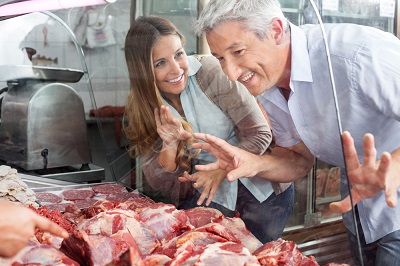

Taxes: There’s their Beef
Co-blogger Bryan Caplan and his favorite philosopher Michael Huemer have debated whether one should eat beef. Neither has persuaded the other.
But there’s one thing that I think they can agree on, a measure that would reduce coercion and marginally reduce the demand for beef: end the tax on beef producers that is used to fund the “Beef: It’s What’s for Dinner” ads.
Baylen Linnekin, a food lawyer who always writes sensibly about government regulation of food, lays out the issue here. It turns out that many ranchers are protesting the tax.
One little quibble: Linnekin writes that the tax raises prices without benefiting ranchers. His view is that the tax shifts the supply curve to the left, increasing prices. He’s right. But it almost certainly raises the demand for beef too, which also leads to increased prices; but this part of the price increase does benefit ranchers. What he could probably argue is that the benefit to many ranchers is less than the part of the tax burden they bear. And there’s a good chance that would be correct; otherwise they probably wouldn’t be protesting the tax.

READER COMMENTS
Alan Goldhammer
Oct 9 2021 at 3:39pm
Why not end all government ag subsidies as well as the taxes for promotion? That would be far more equitable. Farmers have enough financial tools to hedge crop prices without government interference. Of course this would anger all the Senators and House members in farm states.
Thomas Lee Hutcheson
Oct 10 2021 at 6:40am
But farmers/rancher are on average higher income people at that would go against the GOP objective of transferring income to high income people under cover of culture war issues. Pareto optimal but the wrong Paretos benefit. And Progressives can’t do it because rural interests are over-represented in the Senate and Electoral College.
Maybe the ethanol subsidy. Otherwise, not this generation.
Jon Murphy
Oct 11 2021 at 10:39am
Thomas-
We needn’t resort to conspiracy theories and bad-faith arguments to explain the persistence of the subsidies. One of the powerful aspects of Public Choice is it allows us to analyze these topics without needing to resort to such conspiracy theories.
In this case, the insight is even more simple: dispersed costs and concentrated interests. The beef taxes are a relatively small portion of the budget of any given consumer. They do not have an incentive to organize to end the tariffs. For the farmers, they do have such an incentive. It’s one of the reasons why the latest Farm Bill enjoyed such broad support regardless of political affiliation and share of agriculture in the state’s economy.
David S
Oct 15 2021 at 12:56am
Just to play the other side:
Is there perhaps a case to be made for subsidizing food production, on the grounds that while overproduction is inefficient, underproduction leads to death by starvation. Given the extreme desire to avoid death by starvation by everyone, perhaps overproduction of food is actually a public good?
Dylan
Oct 9 2021 at 5:47pm
Isn’t this proposal too modest to count as a modest proposal?
Daniel
Oct 11 2021 at 9:21am
LOL. Good post and good comment!
Frank
Oct 9 2021 at 9:59pm
A 1$ tax per unit must raise the supply curve by 1$. The most that could be done to the demand curve would be to also raise it by 1$ — if the tax proceeds were rebated to every consumer. But the demand curve cannot rise that much: Advertising might get a marginal consumer into the market, one who hadn’t heard of beef, but no one else. Advertising cannot affect those who already buy beef, except on a weird interpretation of human nature. À fortiori to spend $1 more per unit.
Ranchers are right.
Andre
Oct 10 2021 at 10:52am
Advertising might get a marginal consumer into the market, one who hadn’t heard of beef, but no one else. Advertising cannot affect those who already buy beef, except on a weird interpretation of human nature.
Does an organization care how often customers buy? Why does Coca-Cola have a marketing budget?
Frank
Oct 10 2021 at 1:47pm
Because Pepsi has one.
robc
Oct 10 2021 at 4:47pm
Yes, and when Coke tried not advertising, Pepsi went from a bit player to real competetion.
robc
Oct 10 2021 at 4:48pm
And that means ads do more than just convince the person who has heard of beef or cola.
Jon Murphy
Oct 10 2021 at 2:53pm
One way that advertising can influence demand is by letting consumers know if the product, sure. But that’s not the only way. As you rightfully note, Pepsi and Coke compete, so they have their marketing budgets. Likewise, beef competes with Chicken, pork, fish, etc. Advertising can sway the answer to the question “what’s for dinner?” In other words, advertising can influence demand by causing people to switch away from substitutes.
Frank
Oct 10 2021 at 6:30pm
Yes, that’s true. And the pork producers are also subject to a tax spent on advertising. If both stopped, beef and pork producers and consumers would all be better off.
The single thing about the tobacco settlement that the cigarette producers liked was a restriction of advertising. Arms race is controlled. Weapons cost less.
robc
Oct 11 2021 at 9:41am
And it is an advantage to big companies as little companies cannot ever catch up. The same reason big business usually favors regulation. It is why Facebook is asking to be regulated.
Comments are closed.